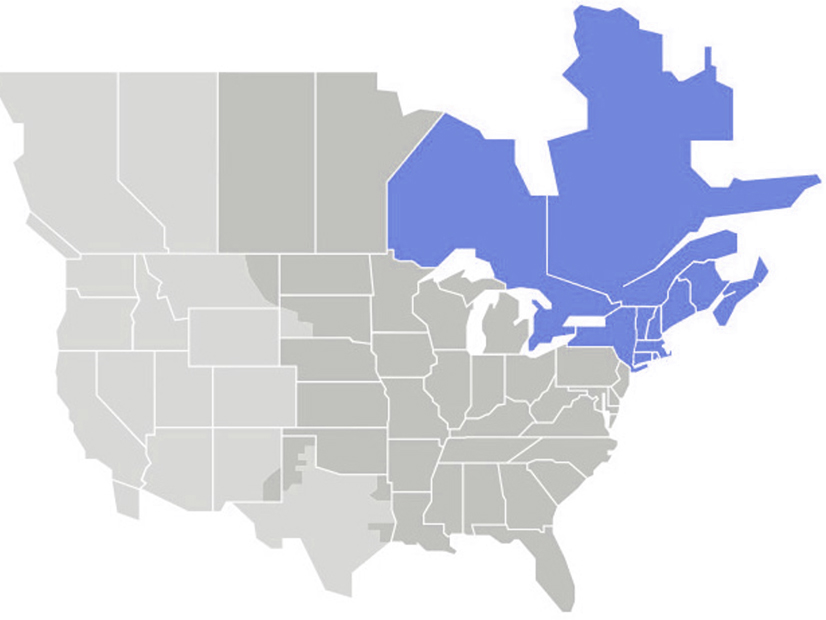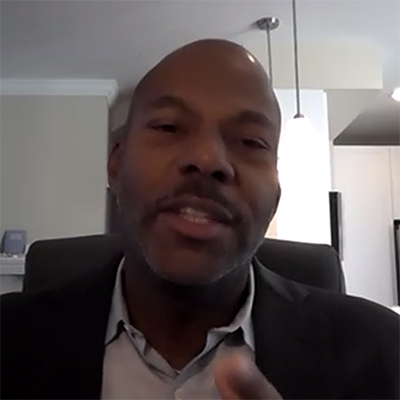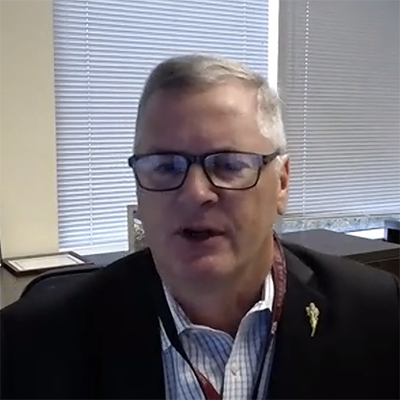
The Northeast Power Coordinating Council will focus its efforts next year on ensuring reliability, integrating distributed energy resources (DERs) and variable energy resources (VERs), and protecting infrastructure from cyber and physical threats.
“We’re meeting one day after the anniversary of the great Northeast blackout of 1965, which precipitated the creation of NPCC … so it’s very timely that we be reminded of how we got here to begin with,” NPCC CEO Charles Dickerson said Wednesday at the organization’s 2021 Fall Compliance and Reliability webinar.
 NPCC CEO Charles Dickerson | NPCC
NPCC CEO Charles Dickerson | NPCC“To decarbonize generation and transportation means there’s gonna be a significant amount of carbon-neutral or zero-carbon-based generation resources coming onto the grid,” Dickerson said. “There’s nearly 30 GW [of offshore wind] proposed by the Biden administration, and that’s separate from the extremely aggressive statutory mandates in the New England states, New York and some parts of Canada.”
The key issue with variable resources right now is that there yet is no scalable way of storing energy, he said.
“The sun doesn’t always shine, and the wind doesn’t always blow … and we get to the point where we have significant issues with underfrequency,” Dickerson said.
Addressing cyber and physical threats is becoming more and more of an issue every day, he said.
“Remember the issue that happened in Ukraine … where the system was disrupted and some bad actors were able to actually actuate and shut off the electric system,” Dickerson said, referring to attacks in 2015 and 2017, when hackers gained access to several Ukrainian electric distribution companies. “So we have to be diligent.” (See Six Russians Charged for Ukraine Cyberattacks.)
The physical threats to infrastructure are also increasing with the rising tempo of extreme weather events.
“It seems like those once-in-a-hundred-year events are happening nearly every year, or every three years, and sometimes we get two of them in a year,” he said.
 EPA eGrid power plant data categorized by ERO and nameplate capacity. | EPA
EPA eGrid power plant data categorized by ERO and nameplate capacity. | EPA
In addition to concerns about DERs and VERs, Dickinson said, “I would be disingenuous if I didn’t tell you that I wasn’t nervous about the pace of change and how we [are] going to integrate it appropriately. Do we have enough resources to do it? Do we have enough transmission infrastructure?”
Other staff and visitors spoke on topics ranging from the NPCC compliance oversight plan (COP) to effective dates and key changes to critical infrastructure protection (CIP) protocols.
The 172-page slide deck of presentations has been posted on the NPCC website.
Texas Review
A member of the joint FERC/NERC event analysis team reviewing the February winter storm that led to unprecedented outages in the Midwest and Texas estimated the group will release the final report by year-end. The joint inquiry team issued a preliminary report in September. (See FERC, NERC Share Findings on February Winter Storm.)
Texas has had these types of events in the past but now has a changing resource mix and a higher population driving demand up, said Rick Hackman, NERC senior event analysis advisor. “And then you have all sorts of interesting wrinkles in how the fuel is brought to the plants and things like that.”
Grid operators’ long-term forecasts predicted a cold week but “were a little iffy,” he said. Once the weather arrived, the “precipitation is what took out a bunch of the wind. So the wind turbines suffered more from the precipitation freezing up than anything else. And then as the depth of cold hit, that’s when we started losing the conventional generation plants,” Hackman said.
The majority of generation outages in Texas were due to loss of the gas-fired plants, he said.
In Minnesota, such extreme weather is normal, so plant operators maintain a state of seasonal readiness all the time. But “when you get down to Texas, we saw a lot of equipment failures due to lack of weatherization,” Hackman said.
Analysts found many issues both on the gas supply side and on the generation side and are suggesting review of a reliability guideline on coordination between the gas pipelines and the generators. “That also needs to be looked at for how it can help prevent this sort of stuff from happening,” he said.
Collaboration, not Competition
The Texas Reliability Entity (TRE) two years ago started talking about how it could work with other regional entities to improve their performance, said Curtis Crews, TRE Director of Compliance Assessments.
 Curtis Crews, Texas Reliability Entity | NPCC
Curtis Crews, Texas Reliability Entity | NPCC“I can tell you, five or six years ago, I would have never dreamed to be at an NPCC workshop or any ERO workshop because we were very competitive,” Crews said. “Unfortunately, that competitiveness didn’t make us effective.”
All members of the ERO want a highly reliable and secure bulk power system, both from the operations side and the CIP side, he said.
“That’s what society needs, and if you saw what was happening down here in Texas [in February], you could see the fabric kind of start to just tear at itself,” Crews said.
REs need collaboration but at the same time require independence and objectivity, he said.
“Part of our role is calling balls and strikes, and sometimes that’s not easy and sometimes it’s not welcomed,” Crews said. “I always try to tell my staff we want to leave people better than what we found them. And we also want to leave better than what we found ourselves at the beginning.”


